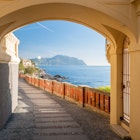
Milan reveals ambitious anti-pollution plan for life after lockdown

Apr 22, 2020 • 2 min read

Milan has announced an ambitious plan to make the city greener and cleaner when it emerges from lockdown, with a major focus on allocating more space for pedestrians and cyclists.
Milan and the surrounding region of Lombardy were hard hit by the COVID-19 pandemic. But as the city screeched to a grinding halt on 8 March due to the lockdown and people stayed at home, traffic congestion dropped by 30% to 75%. With the absence of cars on the roads, residents in the notoriously traffic-choked city reported cleaner air and bluer skies. According to the European Environment Agency, average nitrogen dioxide levels decreased by 24%, compared with the previous four weeks.

Now officials in Milan are hoping to use the reopening of the city in May as an opportunity to encourage residents to reduce their reliance on cars. To help them, local authorities announced on Tuesday that 35km (22 miles) of the city's streets would be reallocated to cyclists and pedestrians. This includes temporary cycle lanes, 30kph (20mph) speed limits, and pedestrian and cyclist priority streets. The ambitious Strade Aperte (Open Streets) plan also makes it easier for people to practice social distancing by widening pavements.
Read more: As people stay home, cities around the world report better air quality

"We are in an emergency and for phase two we must organise ourselves so all those who have to move to make the city work, do it in the safest way for them and to prevent contagion," Marco Granelli, Milan’s councillor for mobility and public works, said in a statement.
"We worked for years to reduce car use. If everybody drives a car, there is no space for people, there is no space to move, there is no space for commercial activities outside the shops," he said. "Of course we should reopen the economy but we should do it a different way than before."

It comes as the European Health Alliance (EPHA) suggested that people living in polluted cities may be more at risk from COVID-19, as prolonged exposure to pollutants could weaken the immune system. "That connection is very likely," Zoltan Massay-Kosubek, policy manager for clean air at EPHA, told Reuters. "But because the disease is new, it still has to be demonstrated."
Earlier this year, Milan banned private cars from driving within the city limits on Sunday, a measure aimed at tackling its pollution problem.
Keep up to date with Lonely Planet's latest travel-related COVID-19 news here.
You might also like:
Rome's newest mural doesn't just look good, it also purifies the air
How Barcelona's car-free 'superblocks' could save lives
Amsterdam's 27-step plan to become more bike and pedestrian-friendly
Explore related stories




 Tips & AdviceCapital One transfer partners: the most valuable options for 2024
Tips & AdviceCapital One transfer partners: the most valuable options for 2024Sep 4, 2024 • 14 min read





